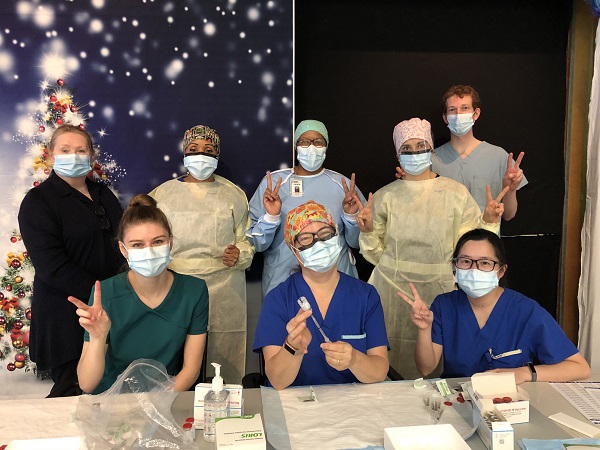Relief takes various forms – clapping, tears of joy, chants of “the vaccine is here, the vaccine is here!”
After months of desperately battling COVID-19, residents, staff and essential caregivers at long-term care centres, retirement homes and congregate living settings across Toronto rang in the new year by receiving their first dose of the Moderna vaccine.
“You could sense the sheer joy from people in the room as they were getting this protection,” says Inthuja Kanagasabapathy, a registered nurse (RN) with the Family Health Team at Toronto Western Hospital (TWH). She was part of the UHN mobile vaccine team that administered the first doses of Moderna to long-term care (LTC) residents in Ontario on the last day of 2020.
“It’s been tough for them for many months but now they have the vaccines, and with them, hope.
“It’s truly an honour for us to be part of this. We are so proud of the teamwork that’s gone into it. And, hearing the feedback from recipients, their smiles and thank yous, is overwhelming to see.”
It’s an effort that’s brought together Toronto Public Health, city staff and teams from nine hospitals and about 160 LTCs, retirement homes and congregate living sites, to protect Toronto’s most vulnerable.
“Long-term care is where the biggest amount of death and suffering has been so being able to get there with help and hope is such a positive thing that really resonates with people,” he says. “The teams are tired but the thing that buoys them along is the gratitude they encounter when they arrive.”
Mobile Team Vaccine came together quickly. UHN provides the backbone support for the coalition of partners and is the central supply depot for Moderna in Toronto. Based on allocations and prioritizing set out by Toronto Public Health and the provincially-mandated Toronto Central Local Health Integration Network, LTC residents are vaccinated by staff from their hospital partners, which were established earlier in the pandemic. UHN has 13 LTC partners.
At lunchtime on Dec. 29, Shiran Isaacksz, Vice President Altum Health & UHN Connected Care, was tasked with leading the organization’s mobile vaccination rollout. With the first Moderna shipment scheduled to arrive the next day and the goal of starting shots in arms the day after that, his team had 48 hours to assemble all the key players at UHN and in the community to make it happen.
It was Connected Care on full display – pulling together inter-disciplinary teams who each use their expertise to make a positive impact, collectively. It was about being able to pivot and scale quickly internally, while also working with community partners and city and provincial health authorities.
These are the principles of UHN’s Integrated Care Program and what allowed the team to get mobile vaccination in the community up and running so quickly. Among the key contributors:
- UHN Pharmacy, leading the way on the rollout of the Pfizer-BioNTech vaccine since mid-December, oversees Moderna distribution and delivery;
- The Family Health Team at TWH, which in April proactively began swabbing residents and staff at many LTCs and has largely staffed the COVID Assessment Centre at TWH, does the vaccinations;
- The UHN Long-Term Care Support Team, which has been providing ongoing assistance and Infection Prevention and Control (IPAC) expertise to LTCs and retirement homes since early in the pandemic, works with each of the homes to ensure they’re ready for the arrival of the mobile vaccine team;
- The LTCs themselves obtain consents from residents, ensure there’s a place for vaccinations to happen and have staff on hand to help organize on-site needs, complete the necessary documentation and monitor recipients for adverse reactions for 15 minutes;
- Members of UHN Connected Care ensure the needs and experience of residents, staff and essential caregivers are prioritized. They also provide the critical backbone support, including education, training, and logistics, which ranges from clearly delineating who handles what tasks at each site and determining how many doses of vaccine are required, to ensuring data on who is vaccinated gets added to the provincial registry and making sure the team has food and water.
At the outset, all teams were governed by two key principles: safety and speed.
A mobile vaccination model was developed and at work in LTCs within 48 hours. Each evening, an Operations Team featuring representation from all UHN teams involved, met virtually to review that day’s events. Over the course of its first week of meeting, workflows were improved, the drawing of doses was refined to ensure no vaccine was wasted and overall efficiency of the process was polished.
Collaborating with counterparts from across the health system, including family medicine teams from other hospitals – Humber River, Michael Garron, North York General, Scarborough Health Network, Sinai Health, Sunnybrook, Unity Health Toronto and Women’s College – brought different skills and strengths together to improve the vaccination model, she says.
“We want this approach to continue, to put down our hospital badges and work collaboratively with other endeavours, not just in an emergency,” she adds. “There are so many opportunities for us to come together for the benefit of our hospitals, and more importantly, for the benefits of all patients.”
This article was provided by University Health Network.


